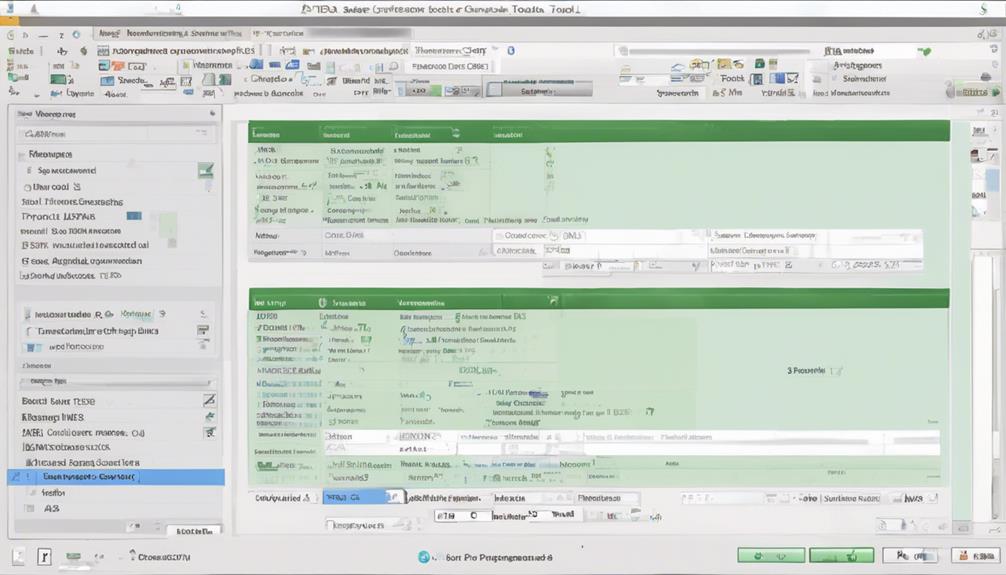To excel in a career in Bulk Data Formatting Services, honing your skills in Python and SQL is paramount for streamlining processes and managing vast datasets efficiently. However, these technical abilities are just the tip of the iceberg. A deeper dive into data analysis methods, statistical modeling, and the use of ETL tools like Informatica and Talend will equip you with a multifaceted skill set that’s indispensable in this field. But what other key competencies are essential to master for success in this dynamic industry? Let’s uncover the top 10 skills that can set you apart in the realm of bulk data formatting services.
Data Analysis
If you frequently find yourself drawn to uncovering patterns and insights from raw data, the skill of data analysis is crucial for a successful career in bulk data formatting services. Data analysis involves the use of various techniques to interpret and make sense of information. In this field, mastering data visualization techniques is essential. Visual representations of data such as charts, graphs, and dashboards can help you communicate findings effectively to stakeholders and make informed decisions based on trends and patterns.
Additionally, familiarity with statistical modeling applications is vital in data analysis. Statistical models allow you to analyze relationships within datasets, predict future outcomes, and identify factors that influence certain trends. Understanding how to apply statistical models accurately can enhance the accuracy and reliability of your data analysis process.
Programming Skills
To excel in the realm of bulk data formatting services, possessing proficient programming skills is paramount. Python proficiency is a key asset in this field, as it allows for the automation of repetitive tasks through scripting and the manipulation of large datasets with ease. With Python, you can develop custom data formatting solutions tailored to specific client needs, increasing efficiency and accuracy in data processing.
Additionally, SQL mastery is crucial for managing and querying databases efficiently. Understanding SQL enables you to extract, transform, and load data seamlessly, ensuring that the formatted data meets the required specifications. Proficiency in SQL also allows you to perform complex data transformations and join operations, facilitating the integration of diverse data sources into a unified format.
ETL Tool Knowledge
With a solid foundation in programming skills, the next step towards enhancing your capabilities in bulk data formatting services involves acquiring knowledge of ETL (Extract, Transform, Load) tools. ETL tools are essential for efficiently processing large volumes of data. Here are some key aspects to consider:
- ETL tool comparison: Understanding the differences between popular ETL tools such as Informatica, Talend, SSIS, and Apache Nifi can help you choose the best tool for specific project requirements.
- ETL tool integration: Learning how to seamlessly integrate ETL tools with databases, cloud services, and other data sources is crucial for successful data processing workflows.
- Scalability: Assessing the scalability of ETL tools is important when working with increasing data volumes over time.
- Data transformation capabilities: Evaluating the data transformation features of ETL tools can help streamline the process of converting raw data into usable formats.
Data Structure Understanding
A fundamental aspect crucial to excelling in the field of bulk data formatting services is a deep understanding of data structures. Data structures refer to the way data is organized, stored, and manipulated in a computer system. In this context, understanding data structures is essential for efficient algorithm optimization and effective database management.
Algorithm optimization relies heavily on selecting the right data structures to ensure the processing of large volumes of data is done in the most efficient manner. By understanding data structures such as arrays, linked lists, trees, and graphs, you can implement algorithms that perform tasks like sorting, searching, and filtering data more effectively.
Furthermore, database management involves structuring data in a way that allows for quick and accurate retrieval, insertion, and updating of information. A solid grasp of data structures enables you to design databases that are well-organized, scalable, and optimized for the specific needs of bulk data formatting services.
Data Cleaning Techniques
When delving into the realm of data cleaning techniques within the domain of bulk data formatting services, a meticulous approach is paramount for ensuring the accuracy and reliability of the processed data. To enhance data quality and optimize text formatting, consider the following techniques:
- Standardizing Data: Ensure uniformity by converting all data into a consistent format, such as date fields following the same pattern.
- Removing Duplicates: Eliminate redundancy by identifying and removing duplicate records, enhancing the overall integrity of the dataset.
- Handling Missing Values: Strategically address missing data points by either imputing values based on averages or removing incomplete records to prevent skewed analysis.
- Error Correction: Implement algorithms to detect and rectify errors like typos or inconsistencies in data entries, improving the overall reliability and quality of the dataset.
Frequently Asked Questions
How Important Is Attention to Detail in Bulk Data Formatting Services?
In bulk data formatting services, attention to detail is crucial for quality control and precision accuracy. Your focus on meticulousness ensures error-free data handling, enhancing client satisfaction and business reputation. Your diligence sets you apart in this field.
What Are the Common Challenges Faced in Large-Scale Data Formatting Projects?
When working on large-scale data formatting projects, you may encounter challenges related to data quality and project management. Ensuring accurate data input, organizing information effectively, and coordinating tasks efficiently are crucial for project success.
Is Experience With Cloud Computing Platforms Beneficial for This Career?
Experience with cloud computing platforms is beneficial for your career in data formatting services. Cloud computing benefits include scalability and efficiency. However, ensure data security concerns are addressed through encryption and access controls to protect sensitive information.
How Do Professionals Stay Updated on Industry Trends in Data Formatting?
Want to stay ahead in data formatting trends? Stay sharp with industry publications, webinars, networking events, and conferences. Engage with experts, absorb new insights, and network with peers for a competitive edge in the field.
Are There Specific Certifications That Can Enhance Career Opportunities in This Field?
To enhance career opportunities in data formatting, certifications offer benefits like specialized knowledge and credibility. They provide skill development opportunities, ensuring you stay competitive in the field. Consider certifications like Certified Data Management Professional (CDMP) or Microsoft Certified: Data Analyst Associate.



